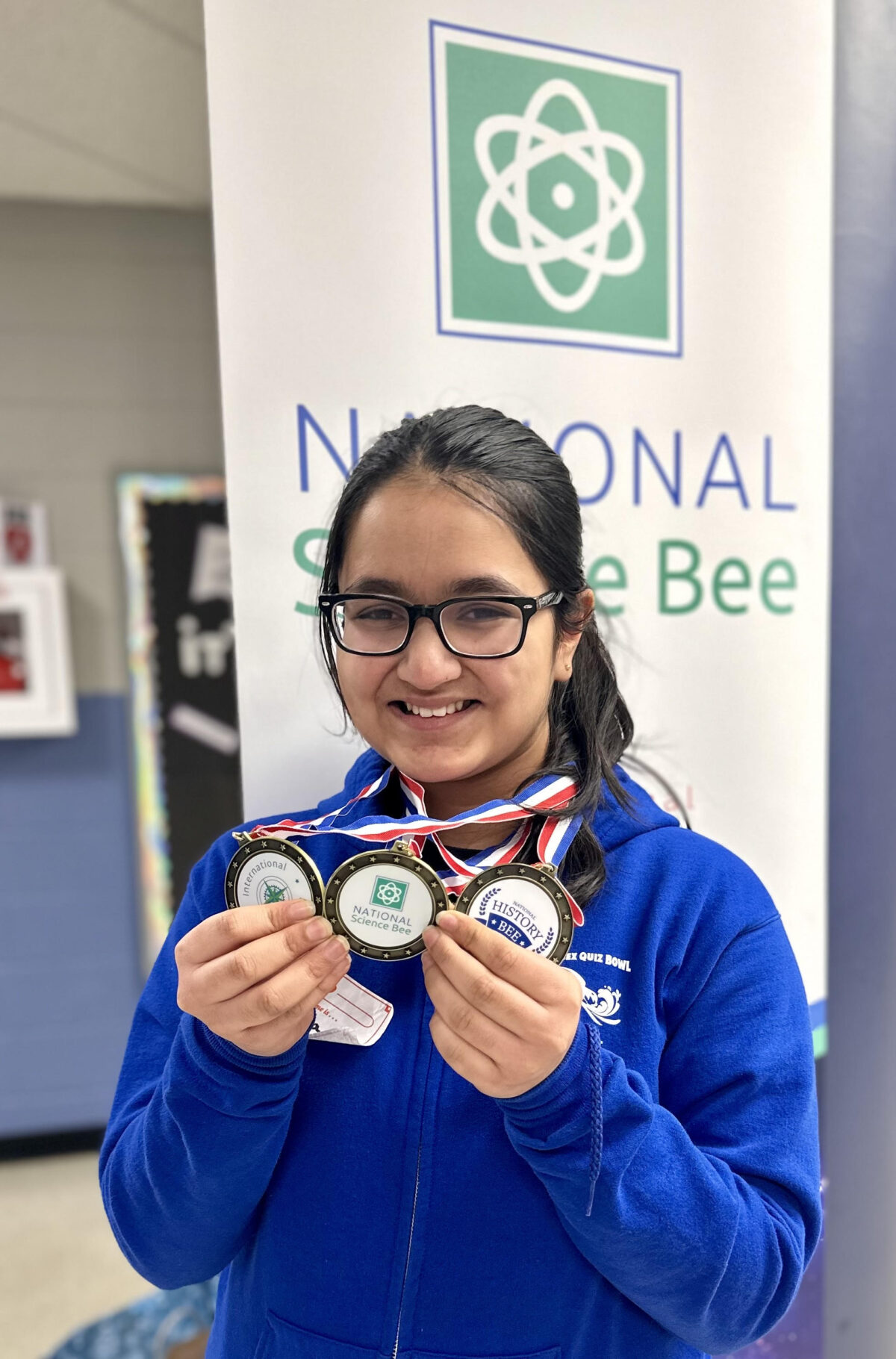National Science Bee
Middle & Elementary School Divisions Homepage
2024 National Champions:
8th Grade – Kaiden Lee, River Trail Middle School, GA
7th Grade – Avi Batra, Hopkins Middle School, CA
6th Grade – Darsh Thakur, Burnet Hill Elementary School, NJ
5th Grade – Aarnav Rudraraju, BASIS Indpendent – Fremont, CA
4th Grade – Aditya Rao, Challenger School – Strawberry Park, CA
3rd Grade and Younger – Yakshit Bagad, Reeves Elementary School, TX


The National Science Bee Middle & Elementary School Divisions Overview

The National Science Bee is a quiz competition for individual students, testing knowledge of all aspects of science at a grade-appropriate level. Students first take the free Online Regional Qualifying Exam (ORQE) which is available in the fall. Approximately 60% of students nationwide who take the ORQE pass it to move on to the Regional Finals, which are held both online and in-person from October-May and feature paragraph length quiz questions with questions moving from harder to easier information on each topic. The top 50% of students in each age division at each Regional Finals qualify for the 2024 National Science Bee National Championships on Memorial Day weekend in Orlando. Students who qualify for the National Championships in the 2022-23 or 2023-24 academic years, or who finish in the top 50% in their age division at a Regional Finals tournament in Fall 2024 also qualify for the 2024 International Environmental Science Olympiad from December 27-31, 2024 in Puerto Rico.
Jump To:

Competition Format
For students competing in the Middle School and Elementary School Divisions, the National Science Bee is a three-stage competition, consisting of an Online Regional Qualifying Exam, the Regional Finals, and the National Championships. Students can also qualify for the International Environmental Science Olympiad by competing in the National Science Bee.
1
Online Regional Qualifying Exam
The first stage of the National Science Bee for the Middle and Elementary School Divisions is the Online Regional Qualifying Exam (ORQE). Prior to taking the ORQE, teachers, administrators, parents, or another adult family member must first create a free sponsor account at www.iac-exams.com. Once they have created an account, sponsors will receive the link to the exams, and students can take the ORQE at any point. There is no cost to take the ORQE and there is no hard deadline for students to take it: the ORQE will remain available until the registration deadline for the last Regional Finals passes. However, we recommend that students take the ORQE as early as possible in the academic year so that they have more time to prepare for the Regional Finals and compete at up to 3 Regional Finals sites if they qualify.
Online Regional Qualifying Exam: Exam Structure
The ORQE is a 50 question multiple choice exam (4 answer choices per question) on all aspects of world Science. Students have 20 minutes to take the exam, and the exam is scored automatically and immediately. In most cases, sponsors will see if the student qualified immediately in the Sponsor Dashboard, though early in the academic year, some students may receive a designation of “pending” if their score is close to where the qualifying cutoff score will be set. Once it is set, the pending designation will be removed and students will be listed as Qualified or Did Not Qualify in the Sponsor Dashboard.
There is no penalty for an incorrect answer, so students should answer each question as best as they can. The exam is designed so that on harder questions, students can often rule out 1 or 2 answer choices. About half of the questions have a visual component (i.e. a map, photograph, chart, etc.); for visually-impaired students who need to have the exam read out loud to them, these questions are not counted and their scores are prorated.
Online Regional Qualifying Exam: How to Prepare & Qualification Procedures
Students should use the ORQE versions from prior years to prepare (see Practice Resources). They should review basic science concepts in science in advance (they can look at past questions from Regional Finals to get a sense of the sort of concepts that we ask about; these also frequently appear on the ORQE). Nationwide, approximately 60% of students who take the ORQE will qualify for the Regional Finals. The qualifying scores vary from year to year and by age division, but typically students need to answer 20-25 of the questions correctly in order to qualify. If students do not qualify on the ORQE, a second-chance ORQE is available beginning in January so that they can try again.
For all questions on the 2023-24 Online Regional Qualifying Exam, please email ems-info@iacompetitions.com.
2
Regional Finals
The second stage of the National Science Bee for the Middle and Elementary School Divisions is the Regional Finals. The Regional Finals are held throughout the year both online and in person. A full list of Regional Finals is available here on the Registration page. Students who have qualified on the ORQE may compete up to 3 times at the Regional Finals. The Regional Finals tournaments are held in conjunction with the Regional Finals for the National History Bee and National Science Bee, so students who qualified on the ORQEs for those subjects can compete in all 3 events.
Regional Finals: Timing of Tournaments
At in-person Regional tournaments, typically the Science Bee is held in the late afternoon; the History Bee is held in the morning, and the Geography Bee is held in the early afternoon. At online tournaments, the Bees for two subjects are held on a Saturday, and the third is held on Sunday afternoon. The time and day that each subject is contested on an online event varies from one tournament to another, so that students who cannot compete on Saturdays (or Sundays) will have options to play all subjects at their preferred time over the course of the academic year.
Regional Finals: Tournament Structure
The Regional Finals consists of 3 preliminary rounds, each with 30 questions, and 1 Final Round, likewise with 30 questions. All students play in all preliminary rounds; the scores are then added together to determine placement. Typically 20-50% of students then make the Final Round to determine the Regional Champion in each age division. To qualify for the National Championships, students must finish in the top 50% of their age division after the preliminaries rounds, inclusive of odd numbers and ties for the final Nationals spot. There are separate age divisions for students in 8th grade, 7th grade, 6th grade, 5th grade, 4th grade, and 3rd grade and younger. At some tournaments with small numbers of students in an age division, two or more divisions may be consolidated. However, the qualification for the National Championships will be determined solely based on a student’s official age division: students are never at a disadvantage in terms of national championships qualifying if age divisions must be consolidated.
Regional Finals: Game Play Rules
All questions at the Regional Finals are played using a buzzer system and take the form of a short paragraph. Please see here for sample questions to practice with. The questions are read out loud to students, and the clues in each question are arranged in descending order of difficulty. Students buzz in as soon as they think they know the answer. If they are correct, they score a point; if they are incorrect, they cannot ring in again on that question. Three incorrect answers kills the question. If a student is the third student incorrect before the end of the question, they lose a point (because they have killed the question for the remaining students who now are unable to hear the rest of the question). If they are the first or second student incorrect, or if they are the 3rd student to answer incorrectly but the question has already been read to completion, they do not lose a point.
Once students reach 5 points in a round, they are done for the rest of the round. This ensures that if one student is particularly gifted, they will not run away with most of the questions while the other students get frustrated. However, students can earn up to 10 bonus points in each round depending on how quickly they go out (i.e. a student who answers the first 5 questions correctly scores 15 for the round).
Regional Finals: Study Guides
Each Regional Finals is played using one of three question sets: Red, White, or Blue. There is no difference between the sets in terms of content focus or difficulty. Students can compete at up to 3 Regional Finals, once on each question set. Each question set has a Study Guide that is compiled once the questions for that question set have been written, so students who are competing at a tournament should review the correct study guide in advance! The Study Guides do not contain information on every question in the tournament, but they typically reference things to know about harder topics that will come up.
Regional Finals: Tournament Registration and Logistics
Students and their families must register for each Regional Finals tournament on the Registration Page. Typically, the deadline is 12 days in advance of each tournament, but please check the Registration Page to be sure. After the deadline passes, a wait list is maintained for each tournament: we will attempt to accommodate as many students as possible, but we need to ensure sufficient staff first. The cost to compete in the Regional Finals of the National Science Bee is $47 per tournament with a $10 surcharge if registered for after the deadline. There is no obligation to bring a question reader or buzzer system to the tournament; IAC will provide these. An email will be sent in the week prior to each tournament, as well as within a week after the tournament with further logistical details.
For all questions on the 2023-24 Regional Finals, please email ems-info@iacompetitions.com.
3
National Championships
The third stage of the National Science Bee for the Middle and Elementary School Divisions is the National Championships, which for the 2023-24 academic year will take place at the Hyatt Regency Orlando from May 23-27, 2023. The rounds for the National Science Bee will begin on the morning of May 24 and end on the afternoon of May 26. The National Championships for the National Science Bee are also held in conjunction with the National Championships of the National History Bee, National Geography Bee, and many other events. There are also a number of Science-themed National Championship Exams. Each event is held at different times during the weekend, so students who wish to compete in multiple events may do so.
National Championships: Tournament Structure
At the National Championships, all students compete in 4 preliminary rounds using the same style of questions on which they played at the Regional Finals. The rounds are held in different blocks of 2 rounds each which are played back to back. Students are assigned to 2 blocks based on their full schedule of events for the weekend. Students’ preliminary round point totals are summed, and then the top students (usually around the top 25-35%) qualify for the Playoff Rounds. The number of students who qualify for the playoffs is a function of enrollment in each age division at Nationals, and will be clarified to all before the competition begins.
The cost to compete at the 2024 National Championships is $149, or $145 if registration takes place before December 31, 2023. Registration for the National Championships opens in November and runs through early May on this page. We are expecting approximately 1000 students to attend the 2024 National Science Bee National Championships! Nationals weekend will also feature many other events, including the Opening Ceremonies, a Family Quiz Night, Universal Studios Night, Intro to Model United Nations, various talks and receptions, and the Jeopardy! Charity Games. A full schedule of 2024 Nationals Events is available here. For all questions on the 2024 National Championships, please email ems-info@iacompetitions.com.
Stage
International Environmental Science Olympiad
Students who compete in the Middle and Elementary School Divisions of the National Science Bee can qualify for the 2024 International Environmental Science Olympiad which will be held in Puerto Rico from December 27-31! Students who qualify for the National Championships in the National Science Bee also qualify for the International Environmental Science Olympiad.
The International Environmental Science Olympiad is a five day-long event with numerous competitions, field trips, family activities and more. In each event, medals are awarded to the top 3 competing students in each age division. US students compete for their state; students from other countries (or students in the USA who were born abroad or who have foreign citizenship) represent those countries. Please see www.iacompetitions.com/ieso for further details on the International Environmental Science Olympiad. For all questions on the 2024 International Environmental Science Olympiad, please email david@iacompetitions.com.
National Science Bee Practice Resources
Rules & FAQs
National Science Bee Results
Past National Champions
On mobile, swipe right to view all columns
| Year | Division | National Champion | School | City | State |
|---|---|---|---|---|---|
| 2023 | 8th Grade | Neha Pandya | Challenger Strawberry Park | San Jose | CA |
| 2023 | 7th Grade | Kaiden Lee | River Trail Middle School | Johns Creek | GA |
| 2023 | 6th Grade | Abhiram Kuchi | John M. Horner Middle School | Fremont | CA |
| 2023 | 5th Grade | Darsh Thakur | Burnet Hill Elementary School | Livingston | NJ |
| 2023 | 4th Grade & Younger | Avi Thakur | Burnet Hill Elementary School | Livingston | NJ |
| 2022 | 8th Grade | Aldric Benalan | Community Middle School | Plainsboro Township | NJ |
| 2022 | 7th Grade | Logan Lam-Chan | Cabrillo Point Academy | Poway | CA |
| 2022 | 6th Grade | Bhaskar Moorthy | Glasgow Middle School | Baton Rouge | LA |
| 2022 | Elementary School | Darsh Thakur | Burnet Hill Elementary School | Livingston | NJ |
| 2021 | 8th Grade | Aaryan Sumesh | Fairfax County Public Schools | VA |
|
| 2021 | 7th Grade | Dhruv Veda | Burleigh Manor Middle School | Ellicott City | MD |
| 2021 | 6th Grade | Hridhaan Banerjee | Colvin Run Elementary School | Vienna | VA |
| 2021 | Elementary School | Bhaskar Moorthy | Buchanan Elementary School | Baton Rouge | LA |
| 2020 | 8th Grade | Anurag Sodhi | Burleigh Manor Middle School | Ellicott City | MD |
| 2020 | 7th Grade | Joshua Wang | Wisconsin Hills Middle School | Brookfield | WI |
| 2020 | 6th Grade | Vishnu Mangipudi | Odle Middle School | Bellevue | WA |
| 2020 | Elementary School | Bhaskar Moorthy | Buchanan Elementary School | Baton Rouge | LA |
| 2019 | 8th Grade | Darryl Wang | Middlesex Middle School | Darien | CT |
| 2019 | 7th Grade | Akshansh Chauhan | Daniel Wright Junior High School | Lincolnshire | IL |
| 2019 | 6th Grade | Joshua Wang | Wisconsin Hills Middle School | Brookfield | WI |
| 2019 | Elementary School | Vishnu Mangepudi | Cherry Crest Elementary School | Bellevue | WA |
| 2018 | Middle School (7th-8th Grades) | Shiva Oswal | Homeschool | Cupertino | CA |
| 2018 | Elementary (6th Grade & Younger) | Anurag Sodhi | Burleigh Manor Middle School | Ellicott City | MD |
| 2017 | Middle School (7th-8th Grades) | Lawrence Zhao | Next Generation School | Champaign | IL |
| 2017 | Elementary (6th Grade & Younger) | Anurag Sodhi | Centennial Lane Elementary School | Ellicott City | MD |
| 2016 | Middle School (7th-8th Grades) | Dalton Manbeck-Mosig | Homeschool | Menlo Park | CA |
| 2016 | Elementary (6th Grade & Younger) | Shiva Oswal | Homeschool | Cupertino | CA |
